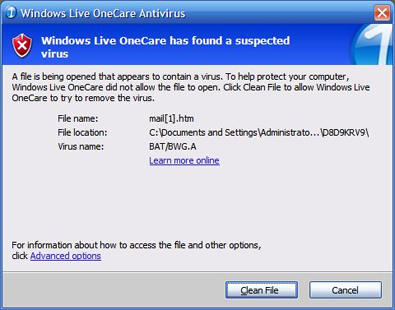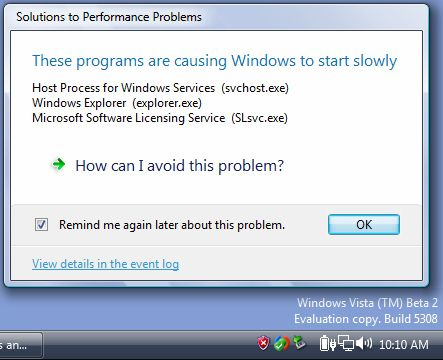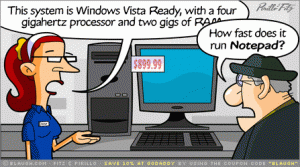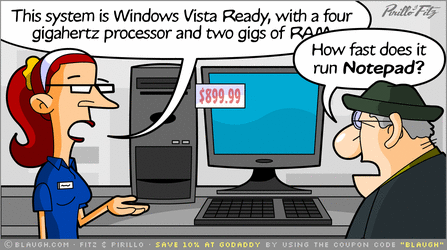I’m glad to see ZDNet agrees with me. David Berlin poses the question: By 2010, will Windows ‘Seven’ (or any desktop OS) really matter? My question a few days ago was: Windows Seven in 2010. Does Anyone Still Care?
David goes on to explain how almost everything he does nowadays is done in the browser – that is online. His experience with installed software is painful – like the recent Vista upgrade. As for myself, I still have to cool off before I can tell you how badly a forced Microsoft Money update scr***d me and all online banking users. Arrogant ignorance by Microsoft, as usual.
On the other hand, are these new Windows versions getting any better? We can read stories of high-profile bloggers switching back to XP, analyst firms advising their CIO clients NOT to upgrade to Vista, but today is the first time we here a major PC manufacturer (Acer’s President) clearly labeling Windows Vista a flop. Technically as well as commercially.
“The whole industry is disappointed with Windows Vista”
“Users are voting with their feet …. Many business customers have specifically asked for Windows XP to be installed on their new machines”
It’s great that he can now openly say this – a few years ago Microsoft would have penalized Acer.
Analysts think the problem is that consumers prefer lower-cost machines that might not work well with Vista.
“Most of the machines I see pitched in catalogs are in the $700 range, certainly under $1,000,”
“Computers with that amount of hardware are a better fit for XP. With Vista’s requirements, people may be thinking about sticking with XP, and putting less money into the hardware.”
Exactly. But this is a chicken-end-egg issue: why would anyone want to buy stronger hardware just to run a new Operating System? It only makes sense for tangible benefits, i.e. gaming, video editing..etc. Otherwise, buying more powerful machines only so they can be bogged down by Vista (or Windows Seven for that matter) is meaningless arms race. For productivity / business use, the trend is just the opposite: with the move to Web Applications, wee need less CPU, storage, memory (well, maybe not that, with zillions of FireFox tabs open…). Since I switched to Web Apps, I barely ever hear the fan come up in my trusted old laptop
I’m confused though:
“Microsoft reports Microsoft itself says Vista has been a smashing success, saying it had already sold 20 million Vista licences by March.”
With consumers not buying, corporate CIO’s not upgrading, manufacturers being disappointed … where did those 20 million customers come from?
Update (7/23): It’s really amazing how Donna Bogatin does not get it. She writes off David Berlind’s article as simply based on the author’s personal computing habits… Web Worker Daily, can you hear this? Microsoft OS extinction case? What are you talking about, Donna? I re-read and re-read the Berlind piece and don’t see it. That’s not what he (and I) are talking about. But here’s another ZDNet-er, Ryan Stewart coming to our rescue: in case it’s not clear, what we’re saying is The desktop OS will still matter, just not which one.
P.S. Donna’s blog does not allow commenting. What a surprise…
Related posts: /Message, Dvorak Uncensored, ParisLemon, Wired,
Update (8/9): a very good analysis by eWeek: Broken Windows
Tags: desktop software, on-demand, saas, Microsoft, Windows, Vista, Windows Vista, Windows 7, Windows Seven, OS, Operating System, Web OS, Web Applications


 No, the online storage company does not enter the race to compete with Google, Zoho, ThinkFree and the like… what they did was a further step to providing seamless offline/online access to MS Office documents.
No, the online storage company does not enter the race to compete with Google, Zoho, ThinkFree and the like… what they did was a further step to providing seamless offline/online access to MS Office documents. 


 . After all,
. After all, 

 AP, Seattle
AP, Seattle Much ado about nothing… in the end, this is all that matters:
Much ado about nothing… in the end, this is all that matters:


[…] Schalalalala…er wir entwickelt: Der CL2, also known as Google Calendar. Mehr darüber hier: http://www.techcrunch.com/2006/03/08/exclusive-screenshots-google-calendar/ […]
[…] Не буду переводить и комментировать эту стью в TechCrunch. Лучше посмотрите сами и оцените! Впечатляет! Тяжелые времена будут у других календарных сервисов… Google рулит! […]
Google Kalender CL2…
Schon lange wurde darüber geschrieben und es gingen auch einige Bilder durchs Netz – jetzt tauchen erneut Bilder des bald erwarteten Google Kalender CL2 im Netz auf. Michael Arrington schreibt in seinem Blog das er nun neue Bilder hat….
Le Google Calendar arrive……
Vu sur TechCrunch,
le calendrier google pointe le bout de son nez….
Pingback by Luca Mondini » Blog Archive » — March 8, 2006 @ 1:30 am
[…] Sono disponibili in anteprima su TechCrunch, i primi screenshot di Google Calendar, applicazione di cui era previsto il lancio qualche mese fa. CL2, questo il nome del progetto, è invece ancora in beta e lo sarà, almeno secondo quello che riporta l’autore del post, Michael Arrington. La fuga di notizie, grazie ad uno dei 200 beta tester coinvolti, ci lascia intuire che CL2 sarà assolutamente integrato con GMail e permetterà la creazione, la ricerca e la condivisione di eventi. E’ probabile inoltre che l’aggregazione di eventi, in stile Eventful, sia implementata. Ai fan della grande G o delle applicazioni Web 2.0 non resta che aspettare, io continuerò ad utilizzare nel frattempo il mio D*I*Y Planner… […]
Más pantallazos de Google Calendar…
Podéis encontrarlos en un post de Techcrunch: Exclusive Screenshots: Google Calendar….
[…] Auf TechCrunch und GigaOM findet ihr die ersten Details und Screenshot zu “CL2&Prime – oder Google Calendar. […]
[…] Im Moment wehen einige Ger�chte �ber ein neues Google Produkt durch das Internet: den “Google Calendar”. TechCrunch hat jetzt Screenshots ver�ffentlicht und gibt auch sonst ein wenig Einblick. […]
Imagenes exclusivas del nuevo google calendar!!!!!!!!!!!!!!…
Primeras imagenes oficiales del proximo lanzamiento de google…
[…] 更多图片 […]
[…] TEch Crunch es como el New York Times de internet, tiene acceso a cosas que nadie tiene, hoy han publicado las primeras capturas dignas de Google Calendar (¡por fin!): […]
[…] TechCrunch heeft de scoop met nieuwe screenshots van een nog te releasen kalender dienst van Google: CL2. CL2 makes it easy — even effortless — to keep track of all the events in your life and compare them to what your friends and family have going on in theirs. […]
Anlise do Google Calendar…
Ainda no abriu mas esta revista j fez a anlise. Parece interessante….
[…] jah ha algum tempo que os rumores comecaram a aparecer mas desta parece que eh mesmo a serio. podem ver com o que se vai parecer o cl2 (eh o nome da coisa e ainda bem porque nohs jah temos um cl), e sempre ajuda a passar o tempo ateh estar disponivel. […]
Imágenes de Google Calendar ¿o CL2?…
Primeras imágenes de lo que será el Google Calendar, aunque al parecer el nombre oficial será CL2. Las tienen en …
[…] La gente de TechCrunch (c�mo no) se ha hecho con las primeras im�genes de Google Calendar CL2, lo cual est� creando un buzz impresionante. Al contrario que los anteriores fakes, Michael Arrington afirma que estos screenshots fueron filtrados por trabajadores de Google, e incluye todas las im�genes con que se ha hecho y una buena descripci�n del servicio. Puedes verlo en este enlace. […]
Pingback by MTYBlogs » CL2 — March 8, 2006 @ 4:07 am
[…] Al parecer este será el nombre del Google Calendar que ya arrojó sus primeras imágenes que pueden ser vistas en Techcrunch y una explicación mas detallada la puede ver en Error 500. […]
[…] 然後文章中列出一些cl2的功能,看起來相當不錯,真令人期待 Exclusive Screenshots: Google Calendar […]
Google Calender…
Ya estan empezando a aparecer algunos datos adicionales y screenshots del Google Calender.
Tiene la misma interfaz que Gmail, y la simpleza de todas las aplicaciones de Google.
……
[…] Para saber mais: Exclusive Screenshots: Google Calendar […]
[…] Des screenshots de CL2, le nouveau logiciel de calendrier de Google. […]
[…] Screeny z nowego narzędzia Google: Exclusive Screenshots: Google Calendar. […]
[…] Aquí podeis ver el resto « Instalar Linux en un iPod 5G […]
[…] Hoy dia, en el blog de techcrunch han aparecido una serie de screenshots de Google Calendar. […]
[…] Uma fuga fez chegar � Web screenshots do Google Calendar. […]